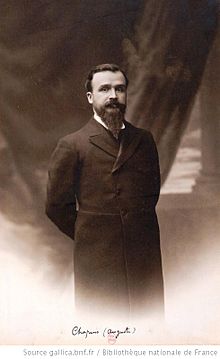Auguste Chapuis (French pronunciation: [oɡyst ʃapɥi]; 25 April 1858 – 6 December 1933) was a 19th/20th century French composer, organist, and professor. He was a student with César Franck. The rue Auguste-Chapuis in the 20th arrondissement of Paris was named after him when he died in 1933.
Auguste Chapuis | |
|---|---|
 Auguste Chapuis in 1905 | |
| Born | 20 April 1858 |
| Died | 6 December 1933 (aged 75) |
| Occupation(s) | Composer, organist |
He was awarded the Prix Rossini in 1886 for Les Jardins d'Armide on a libretto by the playwright Émile Moreau.
In 1894, he succeeded Adolphe Danhauser as head of the municipal orphéon of Paris.
Works (selection)
edit- Ronde, score for 2 female voices or children song. Durand & Cie
- Tambourin, score for 2 female voices or children song. Durand & Cie
- Le Chêne abattu, choir for three equal voices. Score for chant. Durand & Cie
- Les Demoiselles de St. Cyr, musical comedy in four acts based on the play by Alexandre Dumas. Score chant and piano.[1]
- Poèmes d'amour, lyrics by de R. Darzens 1895
- Enguerrande, lyrical drama in 4 acts and 5 tableaux, libretto by Victor Wilder after the poem by Émile Bergerat, created at the Opéra-Comique on 9 may 1892. Choudens 1892 [2]
- Fantaisie concertante for double bass and piano. Durand 1907
- Three pieces for piano: L'Aurore sur le lac ; Dans la montagne ; Rondes enfantines. Durand 1931
References
edit- ^ Chaudens 1921
- ^ Enguerrande sur Google Books